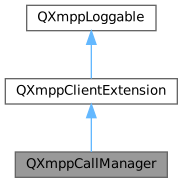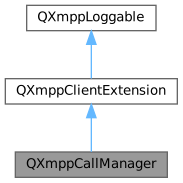The QXmppCallManager class provides support for making and receiving voice calls. More...


Public Member Functions | |
| QXmppCallManager () | |
| ~QXmppCallManager () override | |
| void | setStunServers (const QList< QPair< QHostAddress, quint16 > > &servers) |
| void | setStunServer (const QHostAddress &host, quint16 port=3478) |
| void | setTurnServer (const QHostAddress &host, quint16 port=3478) |
| void | setTurnUser (const QString &user) |
| void | setTurnPassword (const QString &password) |
| bool | dtlsRequired () const |
| void | setDtlsRequired (bool) |
| Q_SIGNAL void | callReceived (QXmppCall *call) |
| Q_SIGNAL void | callStarted (QXmppCall *call) |
| This signal is emitted when a call (incoming or outgoing) is started. | |
| QXmppCall * | call (const QString &jid) |
 Public Member Functions inherited from QXmppClientExtension Public Member Functions inherited from QXmppClientExtension | |
| QXmppClientExtension () | |
| virtual QStringList | discoveryFeatures () const |
| virtual QList< QXmppDiscoveryIq::Identity > | discoveryIdentities () const |
| virtual bool | handleStanza (const QDomElement &stanza) |
| You need to implement this method to process incoming XMPP stanzas. | |
| virtual bool | handleStanza (const QDomElement &stanza, const std::optional< QXmppE2eeMetadata > &e2eeMetadata) |
| You need to implement this method to process incoming XMPP stanzas. | |
 Public Member Functions inherited from QXmppLoggable Public Member Functions inherited from QXmppLoggable | |
| QXmppLoggable (QObject *parent=nullptr) | |
Friends | |
| class | QXmppCall |
| class | QXmppCallPrivate |
| class | QXmppCallManagerPrivate |
Additional Inherited Members | |
 Signals inherited from QXmppLoggable Signals inherited from QXmppLoggable | |
| void | setGauge (const QString &gauge, double value) |
| Sets the given gauge to value. | |
| void | logMessage (QXmppLogger::MessageType type, const QString &msg) |
| This signal is emitted to send logging messages. | |
| void | updateCounter (const QString &counter, qint64 amount=1) |
| Updates the given counter by amount. | |
 Protected Member Functions inherited from QXmppClientExtension Protected Member Functions inherited from QXmppClientExtension | |
| QXmppClient * | client () const |
| virtual void | setClient (QXmppClient *client) |
| virtual void | onRegistered (QXmppClient *client) |
| virtual void | onUnregistered (QXmppClient *client) |
| void | injectIq (const QDomElement &element, const std::optional< QXmppE2eeMetadata > &e2eeMetadata) |
| bool | injectMessage (QXmppMessage &&message) |
 Protected Member Functions inherited from QXmppLoggable Protected Member Functions inherited from QXmppLoggable | |
| void | debug (const QString &message) |
| void | info (const QString &message) |
| void | warning (const QString &message) |
| void | logReceived (const QString &message) |
| void | logSent (const QString &message) |
Detailed Description
The QXmppCallManager class provides support for making and receiving voice calls.
Session initiation is performed as described by XEP-0166: Jingle, XEP-0167: Jingle RTP Sessions and XEP-0176: Jingle ICE-UDP Transport Method.
The data stream is connected using Interactive Connectivity Establishment (RFC 5245) and data is transferred using Real Time Protocol (RFC 3550) packets.
To make use of this manager, you need to instantiate it and load it into the QXmppClient instance as follows:
XEP-0320: Use of DTLS-SRTP in Jingle Sessions
DTLS-SRTP allows to encrypt peer-to-peer calls. Internally, a TLS handshake is done to negotiate keys for SRTP (Secure RTP). By default DTLS is not enforced, this can be done using setDtlsRequired(), though.
DTLS-SRTP by default exchanges the fingerprint via unencrypted XMPP packets. This means that the XMPP server could potentially replace the fingerprint or prevent the clients from using DTLS at all. However, the actual media connection is typically peer-to-peer, so the XMPP server does not have access to the transmitted data.
Support for DTLS-SRTP is available since QXmpp 1.11.
- Warning
- THIS API IS NOT FINALIZED YET
Constructor & Destructor Documentation
◆ QXmppCallManager()
| QXmppCallManager::QXmppCallManager | ( | ) |
Constructs a QXmppCallManager object to handle incoming and outgoing Voice-Over-IP calls.
◆ ~QXmppCallManager()
|
overridedefault |
Destroys the QXmppCallManager object.
Member Function Documentation
◆ call()
| QXmppCall * QXmppCallManager::call | ( | const QString & | jid | ) |
Initiates a new outgoing call to the specified recipient.
- Parameters
-
jid
◆ callReceived()
| Q_SIGNAL void QXmppCallManager::callReceived | ( | QXmppCall * | call | ) |
This signal is emitted when a new incoming call is received.
To accept the call, invoke the call's QXmppCall::accept() method. To refuse the call, invoke the call's QXmppCall::hangup() method.
◆ dtlsRequired()
| bool QXmppCallManager::dtlsRequired | ( | ) | const |
Returns whether the call manager requires encryption using XEP-0320: Use of DTLS-SRTP in Jingle Sessions for all calls.
- Since
- QXmpp 1.11
◆ setDtlsRequired()
| void QXmppCallManager::setDtlsRequired | ( | bool | dtlsRequired | ) |
Sets whether the call manager requires encryption using XEP-0320: Use of DTLS-SRTP in Jingle Sessions for all calls.
- Since
- QXmpp 1.11
◆ setStunServer()
| void QXmppCallManager::setStunServer | ( | const QHostAddress & | host, |
| quint16 | port = 3478 |
||
| ) |
Sets a single STUN server to use to determine server-reflexive addresses and ports.
- Note
- This may only be called prior to calling bind().
- Parameters
-
host The address of the STUN server. port The port of the STUN server.
◆ setStunServers()
| void QXmppCallManager::setStunServers | ( | const QList< QPair< QHostAddress, quint16 > > & | servers | ) |
Sets multiple STUN servers to use to determine server-reflexive addresses and ports.
- Note
- This may only be called prior to calling bind().
- Parameters
-
servers List of the STUN servers.
- Since
- QXmpp 1.3
◆ setTurnPassword()
| void QXmppCallManager::setTurnPassword | ( | const QString & | password | ) |
Sets the password used for authentication with the TURN server.
- Parameters
-
password
◆ setTurnServer()
| void QXmppCallManager::setTurnServer | ( | const QHostAddress & | host, |
| quint16 | port = 3478 |
||
| ) |
Sets the TURN server to use to relay packets in double-NAT configurations.
- Parameters
-
host The address of the TURN server. port The port of the TURN server.
◆ setTurnUser()
| void QXmppCallManager::setTurnUser | ( | const QString & | user | ) |
Sets the user used for authentication with the TURN server.
- Parameters
-
user
The documentation for this class was generated from the following files:
- QXmppCallManager.h
- QXmppCallManager.cpp